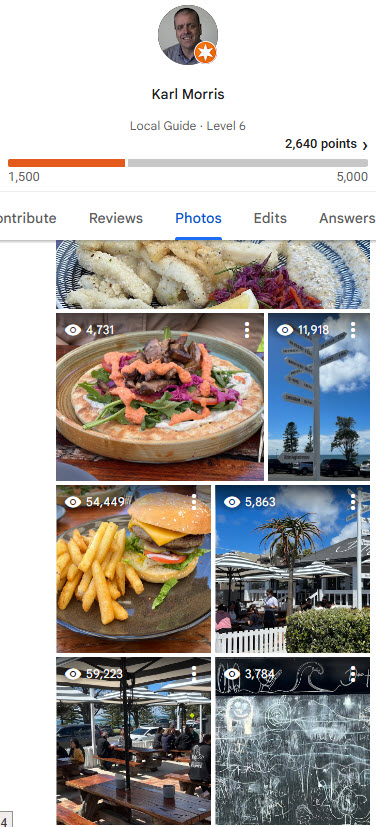For small business owners, a Google Business Profile (GBP) is essential for local visibility. A well-optimised GBP can improve your local SEO, ensuring you appear in Google’s local three-pack and Google Maps searches. But simply having a profile isn’t enough—you need to optimise it. In this guide, we’ll walk you through proven strategies to make your GBP more prominent, engaging, and competitive.
1. Local SEO on your website: The foundation of visibility
Before fine-tuning your GBP, ensure your website is optimised for local SEO. Google cross-references your website with your GBP, so it’s vital that location-specific keywords, structured data (schema markup), and high-quality backlinks are in place. A well-structured website reinforces your local presence and supports GBP ranking improvements.
2. Citations in local directories: Get listed, get noticed
Google evaluates business credibility by checking citations—mentions of your business name, address, and phone number (NAP) across trusted local directories. Inconsistent NAP details can confuse search engines and hurt rankings.
GOOP Digital has previously covered the importance of hyperlinks in local SEO. Quality directory listings—such as local sporting clubs, local business clubs, third-party review sites such as Yelp and TripAdvisor, and industry-specific platforms—validate your business and strengthen your online authority. Read more about this in our previous blog: The Value of a Link for Your Local Sporting Club’s Website.
3. Entity signals: Build real-world credibility
Google assesses entity signals to confirm your legitimacy. These signals include NAP consistency, mentions in news articles, customer reviews, and local citations. The more places your business appears with accurate, matching information, the stronger the entity signal you send to Google.
Local media coverage, partnerships, and customer engagement all contribute to these signals—so consider getting featured in local news, supporting community events, and ensuring your business is mentioned across various platforms.
4. Correct categories: Get classification right
Choosing the right primary and secondary categories in your GBP can significantly impact search visibility. Your primary category should be highly specific to your business, while secondary categories can help expand reach.
For example, a café might list its primary category as “Café” and secondary categories as “Coffee Shop” and “Bakery”. The more relevant categories you include, the more searches you’ll appear in.
5. User-generated content: Leverage customer contributions
Customers play a huge role in making your GBP more visible. Encouraging user-generated content (UGC), such as reviews, photos, and questions in the Q&A section, can significantly boost engagement.
Why does UGC matter?
- Reviews: A high volume of positive reviews improves trust and rankings.
- Photos: Images uploaded by customers increase interaction with your listing. See the images below I took at lunch at Doc Hughes restaurant in Torquay. One image has had nearly 55,000 views, and another has nearly 60,000 views. UGC can have a significant impact on boosting your GBP and convincing users to visit, purchase or call your business. Dependant on what action you want potential users to take.
- Q&A section: Answering common customer questions directly in your GBP enhances user experience and SEO.
6. Keep business hours updated: Accuracy matters
Google prioritises businesses that keep their information accurate. Updating your business hours, including special hours for public holidays, Christmas, and Easter, ensures customers (and Google) know when you’re open. Frequent updates signal to Google that your business is active and relevant.
7. Review count & quality: The power of engagement
Encourage genuine customer reviews—and engage with them. Google sees businesses with regular, high-quality reviews as more trustworthy.
Tips for maximising reviews:
- Ask satisfied customers to leave a review.
- Respond to all reviews—positive or negative.
- Address customer concerns professionally and promptly.
8. The Vicinity Update and why location matters
In late 2021, Google rolled out its Vicinity Update, affecting how businesses rank based on their physical location. BrightLocal’s blog highlights this as “the biggest local search algorithm update in five years”.
GOOP Digital experienced this first-hand when moving from Newtown (a suburb in Geelong) to the city centre. After updating all our NAP citations, we quickly regained our ranking in the local three-pack. This proves how distance and NAP consistency directly impact visibility.
9. User engagement: Encourage clicks and interactions
Google tracks how users interact with your GBP. If customers frequently click for directions, call your business, or visit your website, your profile is more likely to rank higher.
Encourage engagement by:
- Posting regular Google Updates.
- Adding compelling business descriptions.
- Responding promptly to messages and inquiries.
Final thoughts: GBP success takes strategy
A Google Business Profile is more than just an online listing—it’s a powerful local SEO tool that can boost visibility, attract customers, and drive business growth.
By optimising your website, citations, entity signals, and user engagement, your GBP will become more prominent and competitive.
About the Author & GOOP Digital
Karl Morris is a seasoned expert in digital marketing, with a career spanning over two decades. In 2007, he and his wife founded GOOP Digital, which has since grown into one of Australia’s largest small business digital marketing agencies, with a strong focus on regional businesses. With offices in Geelong and Hobart, and clients across the country, GOOP Digital delivers tailored SEO, website design, Google Ads, and social media marketing solutions that help businesses thrive online. If you’re looking for a trusted partner to elevate your digital presence, get in touch with GOOP Digital today.

